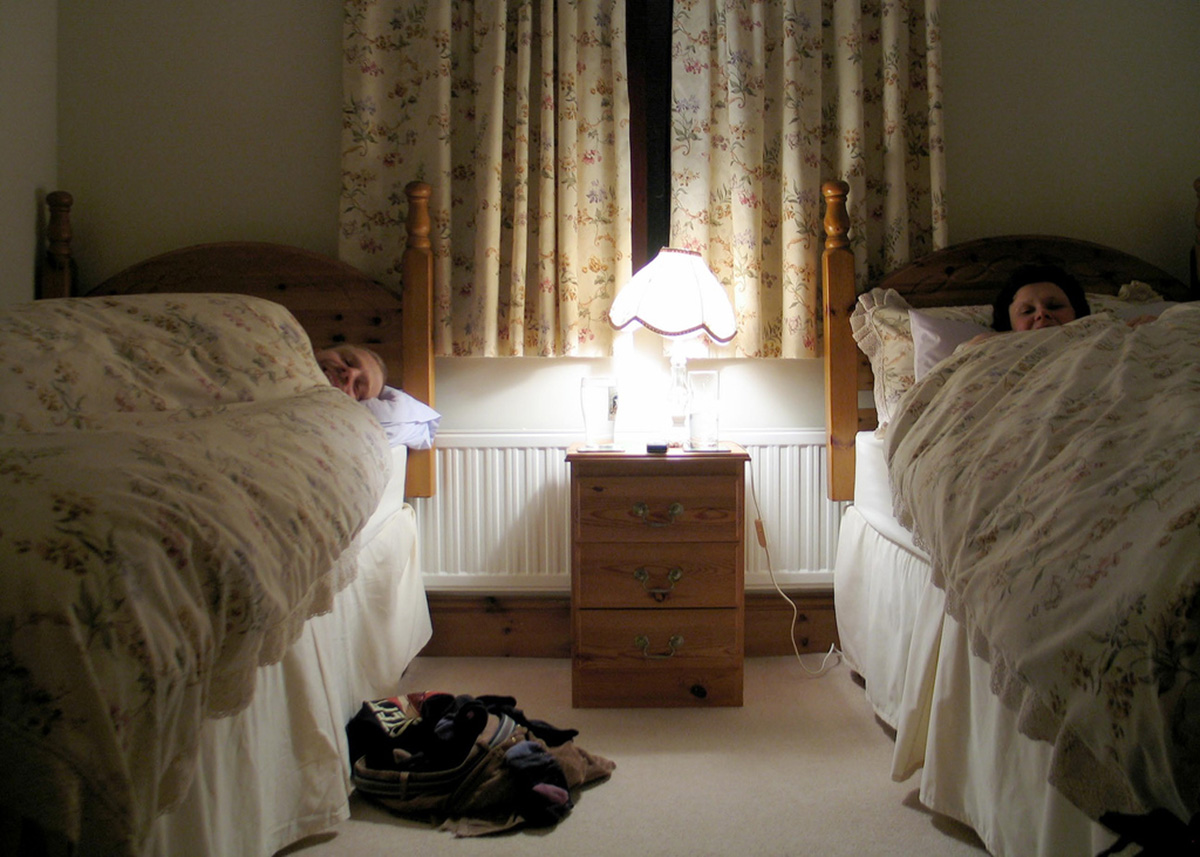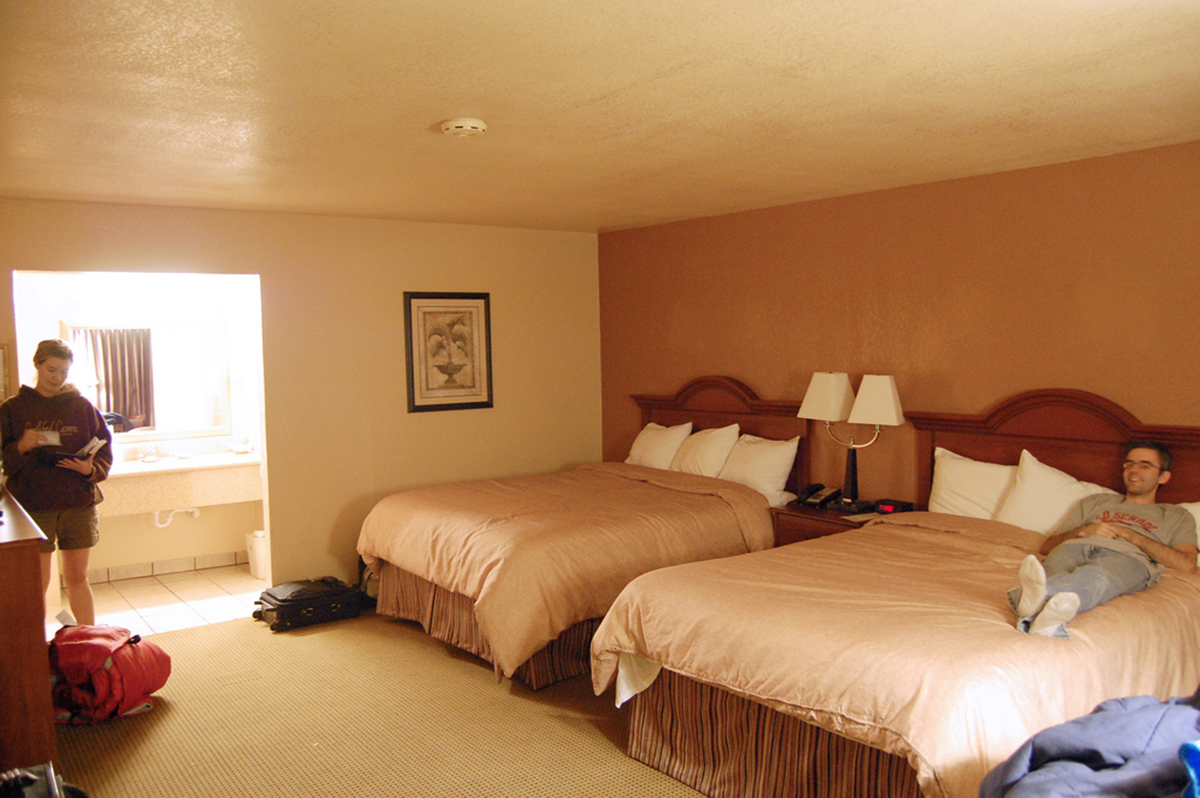Many believe sleeping in separate beds is a sign that a couple is in trouble. Why on earth would a happily married or partnered couple choose to sleep in separate beds? They have got to be avoiding physical intimacy, and if they don't get couples counseling soon they'll inevitably separate. Alternatively, one of them might be suffering from medical problems that prevent shared sleep, something that will definitely affect the quality of their relationship. These opinions are certainly common, but are they prejudiced as well?

We'll take a peek into the world of sleeping separately today. Why do some people do it? Is it a new phenomenon? Does your sex life suffer — and does your relationship?
Why Some Couples Don't Share Sleep
Couples' reasons for sleeping separately are as varied as the couples themselves. Still, they can broadly be divided into two categories: those who sleep separately because they genuinely prefer it that way, and those who do it reluctantly for some other reason. To find out what motivates partners to sleep in different spaces, I talked to a bunch of people — both friends and people on online discussion boards I participate in. The answers were interesting.
Many reported that their different rhythms cause them to sleep separately. When one partner is an early bird and the other a night owl, sleeping together can cause trouble for both. One might feel compelled to go to bed earlier or later than they really want to, but if that doesn't happen, the partner that goes to bed later can wake the other up again.
Sleeping separately makes sense for many couples with have different circadian rhythms, then.
Another common reason not to sleep in the same bed is because the two partners don't see eye to eye on the circumstances under which they like to fall asleep. Some people need absolute silence to drift off, while others prefer to go to sleep with the TV on or while listening to music. One person reported that her husband preferred to sleep in a cool basement during the summer, while she preferred to sleep in her bedroom. This led the couple to routinely sleep apart six months of the year, so it's clear temperature preference can be another reason to sleep in different places.
She thinks one partner's stress can transfer onto the other partner subconsciously while both are sleeping, and that this can lead to arguments. Furthermore, couples who don't always sleep together can't possibly turn sex into a routine chore — instead, they have to be more intentional about it. This, my friend says, is something that leads to a better sex life. I was fascinated by this concept, because so many people are quick to conclude that sleeping apart must mean you don't do the deed at all.
See Also: Relationships: The Challenge of Disengaging
There are also those who reluctantly sleep apart, of course. I bet you can guess the most common cause of this. It's snoring, of course! Cosleeping with babies and toddlers is another common reason for couples to end up sleeping in different beds, while physical pain (like backaches or hip pain) can also mean sleeping together isn't feasible.
My own husband travels for work rather a lot, so I'm fine sleeping alone or sleeping together. When we had our first baby, I felt strongly about cosleeping. He was fine with the idea that I would do so, but he was afraid he would sleep too deeply and end up squashing the baby. This led to an obvious compromise more cosleeping parents might consider if they do want to sleep in the same bed — the baby was on my side of the bed.
Is Sleeping Apart Bad For Your Relationship? And Is It A New Phenomenon?
Sleeping Separately In History
It's clear that sleeping together — not just with your spouse, but also with other family members including older children — was common throughout most of history. That doesn't mean people did it because they preferred to turn sleep into a communal experience, obviously. Instead, sharing your sleeping space keeps you warmer than you would be if you slept alone. This is pretty important if you don't have the luxury of a heated house during the cold months of the year.

Sleeping together also has another purpose, and that's safety in numbers. Prehistoric people would sleep together just like tribes people in today's world do, because sleeping in a tent or wooden, more open house leaves people vulnerable.
This is especially true for children. If you sleep together and something bad happens, the strongest people are there to defend those who are more vulnerable right away — from wild animals or hostile tribes, for example.
Then, there is the fact that the poorer parts of society have just never had as much space available. If you live in one room with your whole family, everyone is going to sleep there too. It is as simple as that. What's interesting is that Royal and aristocratic families have a long history of having separate quarters though. You'll be able to see this if you visit any stately home in Europe, including some of the British Royal family's palaces. The same happened in Asian Royal and noble families.
If a guy has several wives and concubines, it is obvious that everyone has to have their own quarters.
Now that many people have houses large enough to enable them to sleep separately, the practical considerations are largely removed. Modern houses are also generally heated in winter, and no wild animals are going to come and eat you at night. Those facts offer more choice.
Does Sleeping Together Harm Your Relationship And Your Sex Life?
Couples who sleep separately by preference say that this choice does not have a negative impact on either their relationship, or their sex life. There are plenty of other opportunities to bond or be physically intimate, and the lone sleepers I spoke to said that people should let go of the idea that intimacy can only happen in the bedroom after the lights go out.
Reluctant lone sleepers have more varied opinions. Some say that sleeping apart does not affect the quality of their relationship in any way at all, while others say that it does. The ones who do miss sleeping together, but don't for practical reasons, say they'd like to talk to their partners in bed before they actually go to sleep.
See Also: Resolving Relationship Conflict
Not sleeping together can cut conversation time short for couples who work long hours.
Sleeping apart is just another thing modern couples can do, if they feel like it. Some psychologists warn against the practice, which can indeed be a sign of marital problems in some cases. If that does not apply to you, and you just value your nightly privacy or have come to terms with sleeping separately for practical reasons, that's perfectly fine. Your sleep, your choice.
- Photo courtesy of Phil and Pam Gradwell (to be) by Flickr : www.flickr.com/photos/philandpam/2147451634
- Photo courtesy of Moresheth by Flickr : www.flickr.com/photos/moresheth/2981348850

